- Home
- Linda Byler
Hester on the Run Page 13
Hester on the Run Read online
Page 13
“Hester.”
“What?”
“You are openly disobeying your father.” The words were a taunt, a bold announcement cushioned by something that allowed for a seed of rebellion.
“Tell me.”
“I said, no.”
Still, Hans leaned on the cow, and Hester bent to her task. By now, her hands had become accustomed to the hard work of extracting milk from the cow’s udder. Milk came down in thick, heavy streams, creating dense foam close to the top of the pail, muffling the sound of the jets of milk. Hester’s hands stripped the last of the milk from the cow’s udder. She held very still, her head bent, hoping her father would leave.
He didn’t.
“How did you find the Indian woman?”
With the speed of lightning, Hester was on her feet. Frightened, the cow lifted her right foot, kicking the bucket of warm, creamy milk to its side, sending a gushing stream all over the straw-covered floor of the stable. Rivulets of milk carried pieces of straw into the corner.
Hans jumped back, the fury in Hester’s black eyes as lethal as the whirring of a disturbed rattlesnake’s warning. “I told you no.”
Her voice was barely raised above a whisper, but Hans felt as if an arrow had pierced his chest. He slunk out of the cow stable without looking back. Hester retrieved the filthy milking stool and straw-covered pail, patted the next cow and sat down to milk, steady as a rock, her eyes holding no recognizable emotion. Enough was enough. Obedience was one thing, betrayal another.
Kate sensed the change almost immediately and wondered what had occurred that Hans watched Hester with a certain meekness.
She asked Hester.
Hester looked up from her dishwashing, dried her hands on her apron, and came to sit at her mother’s feet, elegantly folding herself onto the tiny wooden stool. She lifted dark liquid eyes to Kate’s blue ones and waited.
Kate lifted her eyebrows.
“I wouldn’t tell him where I got the herbs.”
“Why can’t you tell us, Hester?”
She told her mother the real reason. Kate received the words, nodding her head. Quick tears sprang to her eyes as her foundling described the place of beauty, the old woman’s words, the awareness of the kinship she felt with Uhma.
Kate recognized the spirit of belonging and was humbled. Would they need to give her back someday? The thought was unbearable. This was her beautiful daughter whom God had entrusted to her care! Afraid to mention the frightening subject, Kate smiled, marveling at Hester’s words. She kept hidden the fear of her ever leaving and returning to her people.
From that day, Hester felt a real kinship with her mother. Something so genuine, it clothed her with a sense of belonging, as though it was a valuable garment worn beneath her Amish dress, lightening her days. She had a home, a mother, a place where she was needed and wanted. She loved the constant work, she learned many things, and her days were filled with purpose.
She kept a wary eye out for Hans, however, unable to forget his threats and the way he had purposefully goaded her to anger, inciting that rich fury that had possessed her. No matter how hard Hans tried to change things, Hester’s childish trust had vanished like the straw carried away by the streams of spilled milk.
CHAPTER 12
IN THE FALL, KATE HAD STILL NOT REGAINED HER usual strength. Hans had a talk with Theodore Crane, the schoolmaster, and they agreed that Hester would no longer attend school. She was needed at home.
Almost thirteen years old, she was unable to read very much of anything. She could only decipher easy addition and subtraction. And that was the extent of her schooling.
Noah and Isaac begged to be allowed to go to school, however, eagerly moving ahead of their classes in every subject. Book-learning was a wonder to them, and Kate said that was straight from Hans and his mother, Rebecca.
On Saturday, Kate said she was tired of the deer meat and salt pork. Wouldn’t a mess of brown trout be a wonderful supper? So Hester, Noah, Isaac, and Lissie carried their poles to the tumbling waters of Maiden Creek.
It was a warm kind of day for autumn. The leaves hung in great bunches of red, gold, orange, and yellow, undisturbed by even the gentlest breeze. The air was golden and dusty, thick with the scent of goldenrod, fiery with sumac.
Little puffs of dust rose from their brown bare feet as they walked briskly along the path that led from the road to the creek bottom.
Lissie had learned to whistle and kept up one annoying trill after another, swinging her fishing rod into the tall grasses by the path, sending shivers of dust and seeds from them. She imitated a cardinal, then the call of a crow, finally settling on the lullaby Kate sang to baby Emma.
“Lissie, shut up,” Isaac growled.
“We’re not allowed to say that,” Lissie countered.
“Well, be quiet then.”
Hester’s thoughts were far away, wondering how far Maiden Creek flowed until it reached the river. She only remembered the red-haired youth sometimes—when she didn’t want to. But she couldn’t keep his presence from pushing its way into her mind.
She wanted to forget him. What a name—Paddy! It seemed like a dog’s name. Or maybe a doll’s. And his red hair! She wondered if he was still shuttling people across the river. He had been kind to her.
She wondered how many English people knew about the old Indian woman.
Her thoughts were interrupted by a singing sound, loud and off-key, a sort of rambling chant.
“Yugli vill net beer shiddla
Beer vella net fall.
Yugli vill net hundli schlowa,
Hundli vill net schtecka chawa.”
“That’s not right!” Isaac screeched, swinging his fishing pole in her direction.
“Is too! Yugli would not shake the pear tree, and the pears wouldn’t fall.”
“The dog and the stick aren’t supposed to be yet.”
“How am I supposed to know?” Lissie fell behind, pouting.
She certainly had the right name, that Lissie, Hester thought. She was every bit as independent as Lissie Hershberger and about as outspoken.
Lissie Hershberger had visited the house quite often after Kate’s near death. She lay no stock in the Indian woman’s herbs, saying she’d have come out of that fever all right without those stinking weeds. Everything the Amish needed to know they’d brought with them from Switzerland. They certainly did not need some heathen savage to tell them what to do.
Hester had shriveled up deep within herself, remaining quiet as she went about her work, wondering how grown-ups thought about and understood these things. She shrugged her shoulders as she remembered Lissie Hershberger’s generosity while her mother was so ill. Lissie gave her that impression, but Hester didn’t want to carry it too far. It was better to stay quiet, or soon she would be just like the visitors, her mouth going and going and going, her own knowledge held high for everyone to examine, quickly looking like foolishness. Yes, the Amish were her people, and they had brought many fine recipes and lots of wisdom with them when they crossed the Atlantic Ocean.
Lissie Hershberger had butchered two nasty geese that tried to chase her down at the barnyard. She had gone to the stone water trough to give her old horse a drink and spied these two geese coming at her like two devils with black eyes, hissing and honking worse than a schpence. She vowed to rid Hans Zug’s barnyard of his evil fowl.
She told Hans it was she or the geese, and if he planned on keeping the geese, why then, he’d just have to fa-sark his own sick wife. Hans had shrugged, gone off to sharpen his axe, and caught the geese with his long, steel hook. Lissie heated the water over a roaring fire and stuck the flopping carcasses into the boiling water, plunging them up and down in it over and over. She chortled to herself about how they would never slam into her leg again, their beaks strong enough to break a limb. Here she was now, safe, but with a nasty bruise swelling on the thick part of her leg behind the knee.
Unfashtendich, that’s what.
She butchered those geese, cut the meat into pieces, and rubbed them with garlic. Then she rubbed them with a salt, pepper, and ginger mixture and put them in the large crock in the springhouse till the next day, when she’d set them to boil with parsley from the garden.
She made a gravy with the broth, put knepp on top of the meat, and served it all on a huge platter she got down from the top of the cupboard. It was called Gaenseklein, or goose with gravy in English. It was so good that Hester could almost stop feeling sorry for the fate that had befallen the poor things. You had to understand geese, that was the thing. They were only protecting the barnyard, same as the black bear with her cubs. Animals had a territory they claimed as their own, a natural order of things, and when human beings stumbled onto it, they could get hurt, if they weren’t watchful.
Lissie started in again, now, on her way to the creek, singing the annoying song, whacking at the grass with her fishing pole.
“I’m going to catch the biggest trout,” she yelled, when everyone chose to ignore her obnoxious singing.
Hester smiled to herself and turned to watch as Lissie poked the tip of her fishing pole into Noah’s back.
“Ow!” Noah whirled and was off. Lissie screeched worse than a coyote as she ran to save herself from her brother’s clutches.
Isaac went ahead, not bothering to find out what the end result would be. But Hester stopped, turning to watch. Lissie was sturdy, but no match for Noah’s tall muscular legs. He caught her in due time, whirled her around, and knocked her to the ground where she yowled like a cat.
Dust-covered, but her face shining with glee, she bounded to her feet, slapped her hands together, sending dust flying everywhere, and squealed, “Hoo-hee!”
Hester dug a fat earthworm from the bucket at her feet, wove its slimy, wriggling length in and out of the hook, and set it flying across the water of the creek. She hoped to land it exactly in the middle of the shaded pool beneath the willow tree around the bend where the creek widened.
These trout were finicky. It seemed as if they didn’t want any bait unless it was close to the surface, so Hester was perfecting a way of drawing the wriggling worm toward herself. She kept the bait moving, which was sure to attract the trout in less time.
Lissie still hummed the Yugli song, nodding her head in time to the imagined beats, weaving the hook on the end of her line into the wriggling worm.
Noah and Isaac had gone farther downstream, hoping to get away from Lissie’s constant yodeling, who seemed blissfully unaware that she was causing anyone a disturbance.
They eventually caught the trout, six large, fat ones, just waiting to be cleaned. Over the fire in a kettle they would go, dredged with butter and spices, until flaky white chunks of meat fell off the white, pliant bones.
The return trip was uneventful, except for sighting a snapping turtle sunning himself on a flat rock, then silently disappearing before they had a chance to catch him. Turtle soup was “awful good,” as Lissie put it. Carrots and leeks cooked in a brown broth with the turtle meat was just awful good.
They reached the barnyard, dusty, with the fish flopping from Noah’s tired arms. They met Hans, who was walking behind two horses, his straw hat pulled low.
“What’s going on?” he asked, without a smile.
“Mam sent us fishing. She was hungry for a mess of trout.”
“Oh, she was? Well, what about the corn picking? She didn’t say anything about that, heh?”
“No.” Noah was red-faced, nervous. Isaac stood still.
“The next time you go fishing, ask me first. I spent all afternoon picking corn by myself, which is not necessary. I have big boys to be picking corn with me, not wandering off fishing like that.”
Hester’s and Lissie’s eyes were held to the ground and their bare toes, anywhere more comfortable than Dat’s eyes boring into them, accusing them all of laziness.
The trout were prepared by Mam’s own hand, perfectly done over the fire in the hearth in just a short period of time and then laid on a bed of watercress. They ate the fish along with a big pot of bean soup. For Saturday night, this was a wonderful supper. Normally it was just bean soup.
Everyone had to have their bath on Saturday night in the gigantic wooden washtub behind the makeshift blanket Kate strung across a corner of the room. Church clothes had to be laid out and the wrinkles smoothed away so that in the morning, the chores, breakfast, and getting dressed could all be done, and they could still get to church on time.
Kate was extremely weary, so she allowed the girls to wash the dishes as she sat cuddling baby Emma, hoping to have more energy when it was time to bathe the little ones. She remembered, wistfully, the days when she could work hard from sunup to sundown, without as much as a sore muscle. Now, by mid-forenoon she was tired out.
She looked up, surprised to see her husband in the house at this time on a Saturday night.
“Girls.” His voice was stern.
Lissie turned, her eyebrows raised, her sturdy body poised, as she tapped the dishcloth against her side. Hester chose to ignore him, washing dishes steadily, her back turned.
“Hester, are you listening?”
In answer, she stopped washing dishes, her back straight, her eyes boring into the log wall ahead of her.
“Hester!” The shout was a command.
From her seat by the hickory rocker, Kate’s grip tightened, her eyes flew to her husband’s face. What was this?
Hester turned, her chin lifted in defiance, her black eyes pools of nothing.
Kate shivered and held the soothing body of her baby closer.
“When I speak to you, I expect you to listen. I don’t want you riding horses anymore. Not you or Lissie. It’s not proper, wearing the boys’ trousers. Do you understand what I am saying?”
Lissie’s eyes flew to Hester’s face, which seemed etched in stone, then back to her father’s clouded eyes.
“Dat! You can’t do that!” The protest was out before Hester had a chance to retrieve it. Too late. The damage was done, and she awaited her fate as Hans’s eyes clouded over.
Hester spoke quickly.
“What is your reason, Dat?”
“If you had never learned to ride, you could not have gone to the old Indian woman that day. Now you are caught in her ways. They are not God’s ways.”
Accustomed to having her father on her side, Hester felt confused, as if directions about how to proceed were eluding her, leaving her scrambling wildly for a foothold in a world gone dark.
“But the herbs healed Mam!”
Hester’s words broke from her, driven by desperation. Life without riding Rudy was as unthinkable as breathing without air. An impossibility.
“It was not the herbs that healed her, and you know it. I prayed long into the night, and God answered.”
Hester’s heart jumped and took off racing, draining the blood from her face. Her nostrils flared, her eyes dilated as she drew to her full height. “You. You do not know that.”
Kate rose in one swift movement when she saw Hans raise his large hand and draw it back. She stood between them, wobbling a bit on legs suddenly gone weak.
“Hans, don’t do something you’ll be sorry for later. I beg you. What has gotten into you?”
Kate began crying weakly, a soft sound like a kitten. Hans lowered his hand, strode from the house with footfalls like booms from a cannon, slamming the door until the windowpanes rattled in their wooden frames.
Much later that night, Kate lay awake. Resolve flooded her open eyes. Reaching across, she shook Hans’s shoulder, hard, until he awakened.
“Hans.”
“What is it, Kate?”
“Hans, what has gotten into you? Hester was always your favorite. So much so, that I was afraid it wasn’t natural. She is not of your flesh and blood, or mine. But she never did wrong, my husband. Now she does nothing right. This is very hard for her.”
“She defies me, refusing to name the Indian woman or her whereabouts.”
>
“Why do you need to know if you don’t believe the herbs healed me?”
“She’s going to go back, that’s why. She’ll get mixed up in those old remedies that are nothing but witchcraft.”
“When we found Hester, we saved her life. It is up to her, now, to choose what she wants. We cannot force her to stay or force her to go. If the ways of her people are what she chooses, that is her decision.”
“But her soul will be lost. She’ll burn in hell. She has to remain here among the Amish where she can learn from the ministers how to live a devout religious life. The Indians are heathen.”
“Are they, Hans? Are they?”
In minute detail, she told her husband what Hester had described to her about the old Indian woman and warned him of the error of his ways.
“Hans, if you love me, you’ll see that she needs to be set free, to decide what she really wants. Please.”
Hans lay on his back, his breathing deep and easy, his mind in turmoil. How could he?
He loved Hester as a beloved daughter. He needed her beauty. How could he set her free to go? The only way he knew was to remove all earthy obstacles and expect her to obey. He would lay down rigid rules and see to it that she followed his expectations.
He felt the divide between him and Kate, a chasm, growing even as she spoke, her hands restlessly caressing his chest, her words whispered close to his ear.
Ah, but this precious foundling, so beloved, her price above gold, suddenly growing into a young woman with a mind of her own, the thing that frightened him most.
And now, his own wife was caving in to these heresies. What was wrong with her? Yes, she had been healed, but by his prayers alone.
The corn turned dry and brown; the ears hung heavily from the rustling stalks. Temperatures plummeted. The winds whispered of frost. They carried the cabbage and turnips into the mound of earth that had been dug by Hans’s own hands and finished with a sturdy, wooden doorframe.
The carrots stayed in the ground, their tops covered with straw. When Kate needed a carrot or two, she’d send the children to the garden to uncover them.

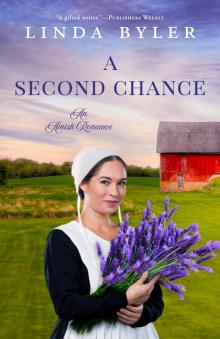 A Second Chance
A Second Chance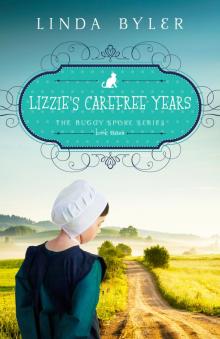 Lizzie's Carefree Years
Lizzie's Carefree Years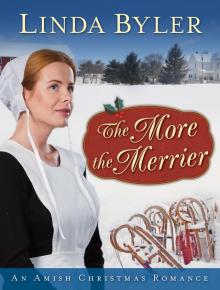 The More the Merrier
The More the Merrier Love in Unlikely Places
Love in Unlikely Places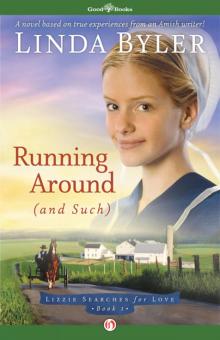 Running Around (and Such)
Running Around (and Such) Wild Horses
Wild Horses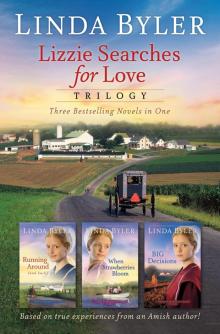 Lizzie Searches for Love Trilogy
Lizzie Searches for Love Trilogy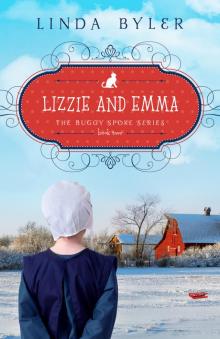 Lizzie and Emma
Lizzie and Emma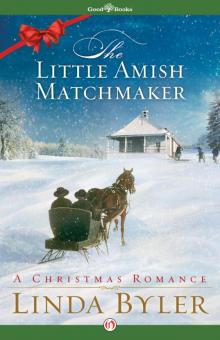 Little Amish Matchmaker
Little Amish Matchmaker The Witnesses
The Witnesses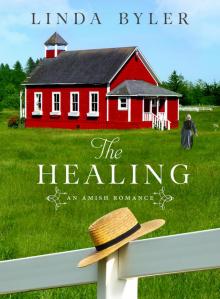 The Healing
The Healing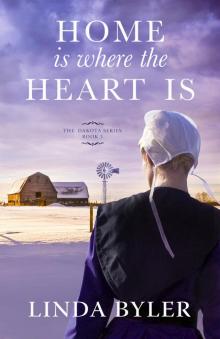 Home Is Where the Heart Is
Home Is Where the Heart Is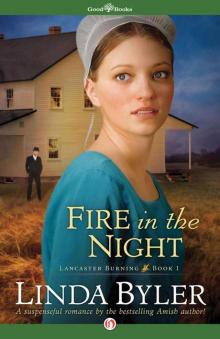 Fire in the Night
Fire in the Night When Strawberries Bloom
When Strawberries Bloom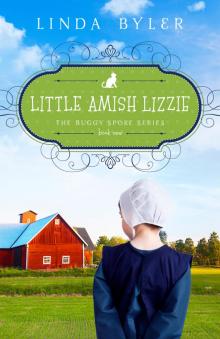 Little Amish Lizzie
Little Amish Lizzie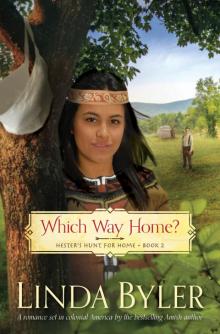 Which Way Home?
Which Way Home?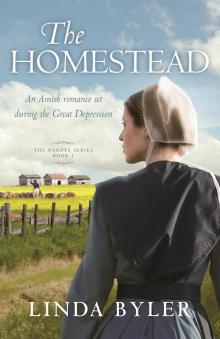 The Homestead
The Homestead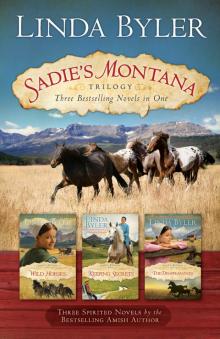 Sadie’s Montana Trilogy
Sadie’s Montana Trilogy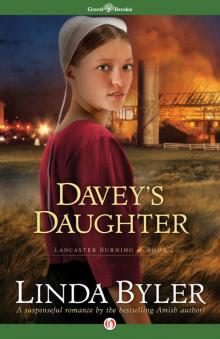 Davey's Daughter
Davey's Daughter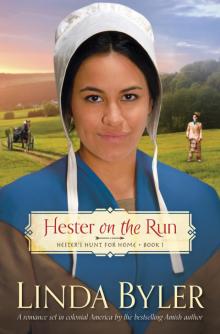 Hester on the Run
Hester on the Run Disappearances
Disappearances Big Decisions
Big Decisions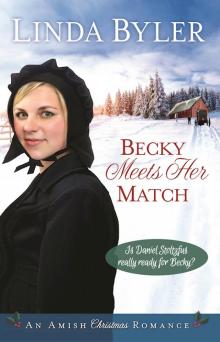 Becky Meets Her Match
Becky Meets Her Match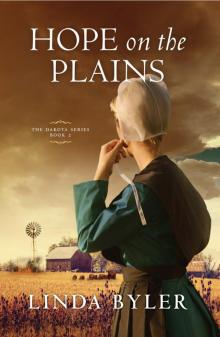 Hope on the Plains
Hope on the Plains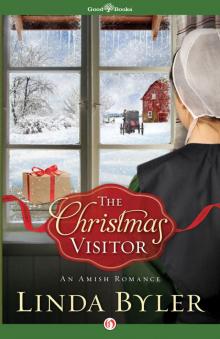 Christmas Visitor
Christmas Visitor